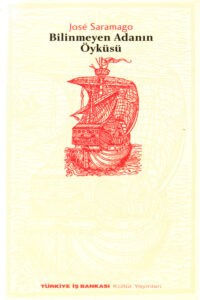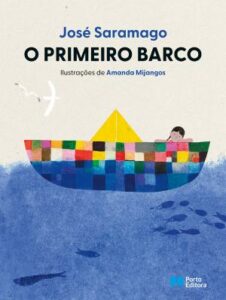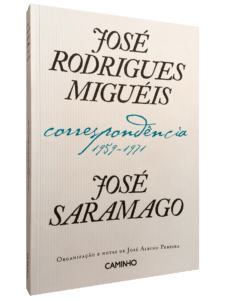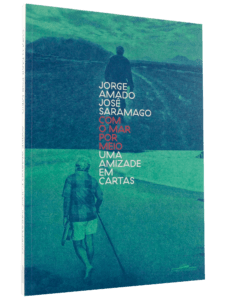The Tale of the Unknown Island

A man came to the king's door and said to him,
Give me a boat.
Portugal

2018 (17th edition)
Language
Portuguese
The calligraphy on the cover is by the writer António Mega Ferreira.
One day, a man went to the king's door to ask for a boat, but that was the door of petitions, and he was not received by the king. After much insistence and knocking at many doors through the intricacies of the royal bureaucracy, he managed to get the king to finally give him the much-desired boat. The cleaning woman at the royal palace was the only crew she could find, and after the boat had been outfitted and cleaned, they slept that night on the pier. The next morning they baptized the vessel and, around noon, with the tide, the Unknown Island finally set out to sea, in search of itself.
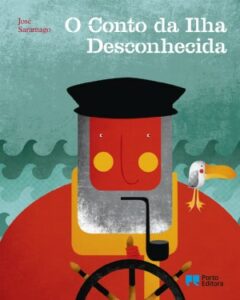
2017; 2019 — Edição especial Moçambique (Coleção Reino das Letras)
Ilustrações de Fatinha Ramos
Language
Portuguese
Um homem foi bater à porta do rei e disse-lhe, Dá-me um barco.
Situada num tempo e num espaço indeterminados, a história do homem que queria um barco para ir à procura da ilha desconhecida promete ser a história de todos os homens que lutam contra as convenções em busca dos seus sonhos e de si próprios.
A Coleção Reino das Letras nasce da vontade de aliar a magia das melhores histórias de todos os tempos à leitura sempre renovada que delas podemos fazer. No Reino das Letras, o rei chama-se Sonho e a rainha Imaginação.
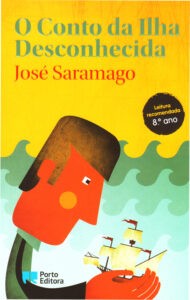
2017; 2019 — Edição especial Moçambique (Coleção Reino das Letras)
Ilustrações de Fatinha Ramos
Language
Portuguese
Um homem foi bater à porta do rei e disse-lhe, Dá-me um barco.
Situada num tempo e num espaço indeterminados, a história do homem que queria um barco para ir à procura da ilha desconhecida promete ser a história de todos os homens que lutam contra as convenções em busca dos seus sonhos e de si próprios.
A Coleção Reino das Letras nasce da vontade de aliar a magia das melhores histórias de todos os tempos à leitura sempre renovada que delas podemos fazer. No Reino das Letras, o rei chama-se Sonho e a rainha Imaginação.
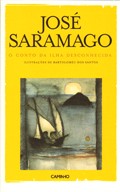
Editorial Path
1999, 12.a ed., 2013
Ilustrações de Bartolomeu dos Santos
Language
Portuguese
Um dia, um homem dirigiu-se à porta do rei para pedir um barco, mas aquela era a porta das petições, e não foi recebido pelo rei.Depois de muita insistência e de a muitas portas bater pelos meandros da burocracia real lá conseguiu que o rei lhe desse , finalmente, o tão desejado barco. A mulher da limpeza do palácio real foi a única tripulação que arranjou e, depois de apetrechado e limpo o barco, dormiram essa noite no cais. Na manhã seguinte baptizaram a embarcação e, pela hora do meio-dia, com a maré, a Ilha Desconhecida fez-se enfim ao mar, à procura de si mesma.
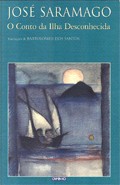
Editorial Path
1999, 12.a ed., 2013
Ilustrações de Bartolomeu dos Santos
Language
Portuguese
Um dia, um homem dirigiu-se à porta do rei para pedir um barco, mas aquela era a porta das petições, e não foi recebido pelo rei.Depois de muita insistência e de a muitas portas bater pelos meandros da burocracia real lá conseguiu que o rei lhe desse , finalmente, o tão desejado barco. A mulher da limpeza do palácio real foi a única tripulação que arranjou e, depois de apetrechado e limpo o barco, dormiram essa noite no cais. Na manhã seguinte baptizaram a embarcação e, pela hora do meio-dia, com a maré, a Ilha Desconhecida fez-se enfim ao mar, à procura de si mesma.
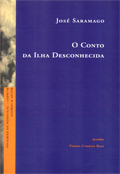
Pavilhão de Portugal – Expo’98 / Assírio & Alvim
1997
Language
Portuguese
Desenhos de Pedro Cabrita Reis
Germany
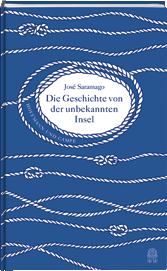
Hoffmann and Camp
2014 (Trad.: Ray-Güde Mertin)
Language
German
Ein Mann bittet beim König um ein Schiff, damit er die unbekannte Insel suchen kann. Obwohl der König nicht daran glaubt, dass es noch unbekannte Inseln gibt, erhält der Mann sein Schiff und macht sich auf die Reise.
Literaturnobelpreisträger José Saramago erzählt in seinem modernen Märchen von einer Zeit, da niemand mehr an unbekannte Regionen auf dieser Welt glaubt. Niemand bis auf den Mann, dessen Beharrlichkeit am Ende belohnt wird. Poetisch, märchenhaft und weise.
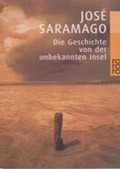
Es gibt keine unbekannte Insel mehr, sagt der König. Aber er gibt dem Mann trotzdem das erwünschte Boot. Eine Scheuermagd fährt mit dem Suchenden hinaus. Im Schein der untergehenden Sonne essen sie ihr karges Abendbrot, dann legen sie sich schlafen. Ein zauberhaftes Märchen des Literatur-Nobelpreisträgers von 1998.

Es gibt keine unbekannte Insel mehr, sagt der König. Aber er gibt dem Mann trotzdem das erwünschte Boot. Eine Scheuermagd fährt mit dem Suchenden hinaus. Im Schein der untergehenden Sonne essen sie ihr karges Abendbrot, dann legen sie sich schlafen. Ein zauberhaftes Märchen des Literatur-Nobelpreisträgers von 1998.
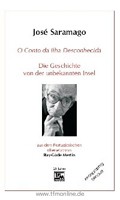
TFM
2005 (edição bilingue), 2007 (Trad.: Ray-Güde Mertin)
Language
German
TFM
2005 (edição bilingue), 2007 (Trad.: Ray-Güde Mertin)
Brazil
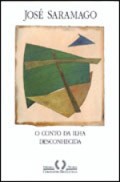
Um homem vai ao rei e lhe pede um barco para viajar até uma ilha desconhecida. O rei lhe pergunta como pode saber que essa ilha existe, já que é desconhecida. O homem argumenta que assim são todas as ilhas até que alguém desembarque nelas.Este pequeno conto de José Saramago pode ser lido como uma parábola do sonho realizado, isto é, como um canto de otimismo em que a vontade ou a obstinação fazem a fantasia ancorar em porto seguro. Antes, entretanto, ela é submetida a uma série de embates com o status quo, com o estado consolidado das coisas, como se da resistência às adversidades viesse o mérito e do mérito nascesse o direito à concretização. Entre desejar um barco e tê-lo pronto para partir, o viajante vai de certo modo alterando a idéia que faz de uma ilha desconhecida e de como alcançá-la, e essa flexibilidade com certeza o torna mais apto a obter o que sonhou. “…Que é necessário sair da ilha para ver a ilha, que não nos vemos se não saímos de nós…”, lemos a certa altura. Nesse movimento de tomar distância para conhecer está gravado o olho crítico de José Saramago, cujo otimismo parece alimentado por raízes que entram no chão profundamente.Inédito em livro, O conto da ilha desconhecida é ilustrado por oito aquarelas de Arthur Luiz Piza.
Chile
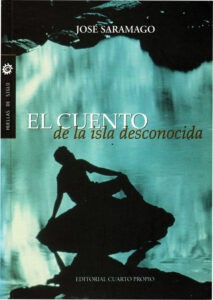
Editorial Cuarto Propio
2000 (Trad.: Pilar del Río)
Language
Spanish
Editorial Cuarto Propio
2000 (Trad.: Pilar del Río)
Korea

hainaim
2007
Language
Korean
hainaim
2007
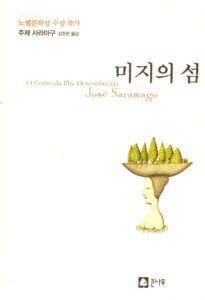
Imprima Korea Agency
2000
Language
Korean
Imprima Korea Agency
2000
Spain
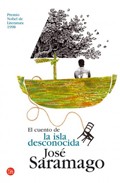
Alfaguara / Punto de Lectura
1998, 2002, 2007 (Trad.: Pilar del Río)
Ilustrações de Manuel Estrada
Language
Spanish
Un suceso histórico, la intención de un noble portugués de ser autorizado por el rey para utilizar una de sus carabelas en la búsqueda de la isla desconocida, le sirve al autor de pretexto para realizar una fábula descarnada del hombre moderno.«… un dulce y sutil cuento sobre el amor y la búsqueda de la identidad personal.» The Washington Post Book WorldSaramago nos muestra que soñar, a veces, es el verdadero camino hacia la felicidad.
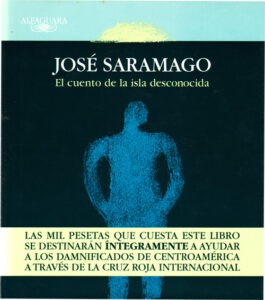
Alfaguara
1998, 2002, 2007 (Trad.: Pilar del Río)
Edição especial de apoio à Cruz Vermelha Internacional.
Language
Spanish
Alfaguara
1998, 2002, 2007 (Trad.: Pilar del Río)
Edição especial de apoio à Cruz Vermelha Internacional.
USA
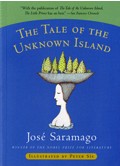
A man went to knock at the king’s door and said, Give me a boat. The king’s house had many other doors, but this was the door for petitions. Since the king spent all his time sitting at the door for favors (favors being offered to the king, you understand), whenever he heard someone knocking at the door for petitions, he would pretend not to hear . . .” Why the petitioner required a boat, where he was bound for, and who volunteered to crew for him, the reader will discover in this delightful fable, a philosophic love story worthy of Swift or Voltaire.
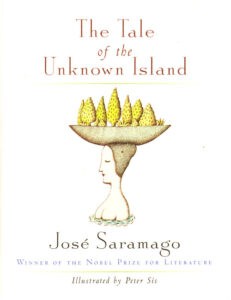
A man went to knock at the king’s door and said, Give me a boat. The king’s house had many other doors, but this was the door for petitions. Since the king spent all his time sitting at the door for favors (favors being offered to the king, you understand), whenever he heard someone knocking at the door for petitions, he would pretend not to hear . . .” Why the petitioner required a boat, where he was bound for, and who volunteered to crew for him, the reader will discover in this delightful fable, a philosophic love story worthy of Swift or Voltaire.

This collection, available exclusively in e-book form, brings together the twelve novels (and one novella) of the great Portuguese writer José Saramago, with an introductory essay by Ursula Le Guin. From Saramago’s early work, like the enchanting Baltasar & Blimunda and the controversial Gospel According to Jesus Christ, through his masterpiece Blindness and its sequel Seeing, to his later fables of politics, chance, history, and love, like All the Names and Death with Interruptions, this volume showcases the range and depth of Saramago’s career, his inimitable narrative voice, and his vast reserves of invention, humor, and understanding.
Finland
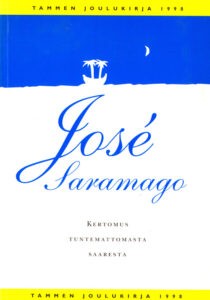
Tammi
1998
Language
Finnish
Tammi
1998
France
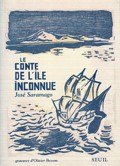
Seuil Jeunesse
2001 (Trad.: Geneviève Leibrich)
Ilustrações de Olivier Besson
Language
French
Parce qu’il est impossible que n’existe pas une île inconnue, un homme s’embarque avec une servante. Et les voilà réunis dans une même quête, songeant l’un à l’autre sans jamais se l’avouer…
Greece
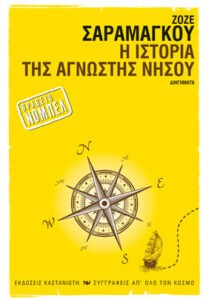
2000, 2014 [Trad: Athina Psillia (Αθηνά Ψυλλιά)]
Em um volume com Objecto Quase
Language
Greek
Ένας άνθρωπος ζητάει ένα καράβι για να βρει την «άγνωστη νήσο». Ποια όμως είναι αυτή η άγνωστη νήσος; Πώς ο καθένας από εμάς μπορεί να την αναγνωρίσει; Πώς αναγνωρίζουμε τον ίδιο τον εαυτό μας; Ένας δικτάτορας πέφτει από την καρέκλα του. Ένας οδηγός προσπαθεί να βρει βενζίνη σε περίοδο κρίσης του πετρελαίου και μεταδίδει τη νεύρωσή του στο αυτοκίνητό του. Ένας βασιλιάς προσπαθεί να αποκλείσει το θάνατο από την επικράτειά του. Kάποια αντικείμενα επαναστατούν στην ανατριχιαστικά γραφειοκρατική κοινότητα των ανθρώπων. Ένας κένταυρος νοσταλγεί το μυθικό παρελθόν του. Kι ένα εφηβικό άχτι εκδικείται το. Eπτά ιστορίες όπου το πραγματικό εισβάλλει στο φανταστικό, και το αντίστροφο. Eπτά ιστορίες για εκείνοτο κομμάτι της πραγματικότητας που διαφεύγει από κάθε λογική διεργασία. Eπτά διηγήματα σ’ ένα διάστημα είκοσι χρόνων, απαραίτητος σταθμός για την κατανόηση της τέχνης του μεγάλου νομπελίστα συγγραφέα.
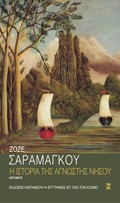
2000, 2014 [Trad: Athina Psillia (Αθηνά Ψυλλιά)]
Em um volume com Objecto Quase
Language
Greek
Ένας άνθρωπος ζητάει ένα καράβι για να βρει την «άγνωστη νήσο». Ποια όμως είναι αυτή η άγνωστη νήσος; Πώς ο καθένας από εμάς μπορεί να την αναγνωρίσει; Πώς αναγνωρίζουμε τον ίδιο τον εαυτό μας; Ένας δικτάτορας πέφτει από την καρέκλα του. Ένας οδηγός προσπαθεί να βρει βενζίνη σε περίοδο κρίσης του πετρελαίου και μεταδίδει τη νεύρωσή του στο αυτοκίνητό του. Ένας βασιλιάς προσπαθεί να αποκλείσει το θάνατο από την επικράτειά του. Kάποια αντικείμενα επαναστατούν στην ανατριχιαστικά γραφειοκρατική κοινότητα των ανθρώπων. Ένας κένταυρος νοσταλγεί το μυθικό παρελθόν του. Kι ένα εφηβικό άχτι εκδικείται το. Eπτά ιστορίες όπου το πραγματικό εισβάλλει στο φανταστικό, και το αντίστροφο. Eπτά ιστορίες για εκείνοτο κομμάτι της πραγματικότητας που διαφεύγει από κάθε λογική διεργασία. Eπτά διηγήματα σ’ ένα διάστημα είκοσι χρόνων, απαραίτητος σταθμός για την κατανόηση της τέχνης του μεγάλου νομπελίστα συγγραφέα.
Netherlands
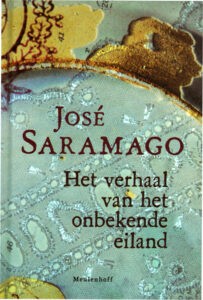
Meulenhoff
2006 (Trad.: Harrie Lemmens)
Language
Dutch
Meulenhoff
2006 (Trad.: Harrie Lemmens)
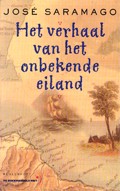
Meulenhoff
2006 (Trad.: Harrie Lemmens)
Language
Dutch
Meulenhoff
2006 (Trad.: Harrie Lemmens)
India
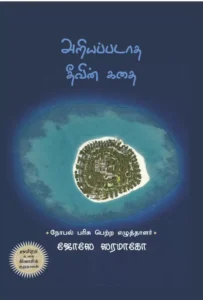
Kalachuvadu Publications
2018 (Trad.: K. Anandh)
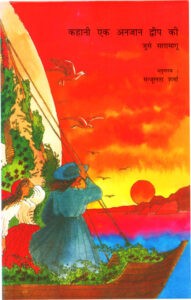
Instituto Camões (Nova Deli)
2006 (Trad.: Manjulata Sharma) (hindi)
Com o apoio do Instituto Camões — Centro Cultural Português, Nova Deli
Language
Hindi
Instituto Camões (Nova Deli)
2006 (Trad.: Manjulata Sharma) (hindi)
Com o apoio do Instituto Camões — Centro Cultural Português, Nova Deli
Israel
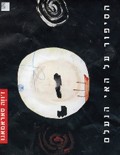
(מרים טבעון)]”איש אחד התדפק על שער המלך, ואמר לו, תן לי ספינה. בבית של המלך היו עוד שערים רבים, אבל זה היה שער הבקשות. כיוון שהמלך בילה את כל זמנו בישיבה ליד שער התשורות (תשורות שהביאו לו, יש להבין), הרי בכל פעם ששמע מישהו דופק על שער הבקשות, היה מתעלם מנוכחותו, ורק כאשר הפך ההדהוד המתמשך של מקוש הברונזה לא רק פומבי אלא אף שערורייתי והטריד את מנוחת השכנים (האנשים התחילו להתלחש, איזה מין מלך יש לנו, שאפילו אינו עונה), רק אז היה מצווה על המזכיר-הראשון ללכת ולברר מה רוצה האיש, כי לא היתה דרך להשתיק את העניין”… כך נפתח הסיפור של סאראמאגו, אגדה מודרנית על החירות להיזרק אל הלא-ידוע. בעוד רוב האנשים מתעניינים באיים הנעלמים רק כשהם חדלים להיות נעלמים, ויש להם צורך לדעת-מראש לאן מועדות פניהם – נדע מהו האי הנעלם שמחפש האיש רק כשנגיע אליו, וכנראה אף-פעם לא נגיע, כי אם נגיע הוא יחדל להיות נעלם… אף האדם הנוסע כמוהו כאי, ועליו לצאת מעצמו כדי לראותו. לפיכך “הסיפור על האי הנעלם” הוא גם סיפור על הזוגיות, על ההתבודדות בשניים, המאפשרת לנו לצאת מעצמנו, בלי לעזוב, כדי לחפש את עצמנו. לחפש, לאו דווקא למצוא. זהו סיפור שופע חן והומור, תענוג צרוף של רגש, שנינות וקסם. הספר כולל 27 ציורי צבע של אסף בן צבי המקיימים דיאלוג מרשים עם דמיונו הבלתי-נדלה של סאראמאגו. הוא ראה אור בעברית ב-2002, כמחווה של הספריה החדשה לאחד מגדולי הסופרים שלה, במלאת שמונים למחבר. אולם הוא בראש-ובראשונה מתנה לעצמנו, לכל מי שיודע שהספרות העולמית בפתח המאה העשרים-ואחת היתה חסרה המון בלי החוויה, הריגוש והתובנות האנושיות שספריו של סאראמאגו מעניקים לנו.

2009 [Trad.: Miriam Tivon]
(em um volume com Objecto Quase — Centauro e Desforra)
Language
Hebrew
שלושה סיפורים שבהם מביט סאראמאגו, בשלושה סגנונות ומשלוש פרספקטיבות, ב”אי הנעלם”: איש ואשה לבדם.
הסיפור על האי הנעלם נפתח באיש שמתדפק על שער הבקשות בארמונו של מלך ומטריד את מנוחת השכנים. המלך עצמו מבלה את כל זמנו ליד שער התשורות שמביאים לו, ולכן מי שפותחת לבסוף את שער הבקשות כדי טפח היא האשה המנקה. אך אין לה ברירה אלא להביא את המלך אישית, כדי לשמוע את הבקשה המוזרה של “המטורף חסר-התקנה”: הלה מבקש ספינה בשביל לחפש את האי הנעלם, בעולם שבו כל האיים כבר התגלו ומופו. כך נפתחת האגדה המודרנית הזאת, השנונה והמרהיבה, שתתגלגל לסיפור מסע שופע חן וקסם, שהוא גם סיפור התאהבותם של איש ואשה.
קנטאור הוא סיפור פנטסטי על חצי-סוס חצי-גבר, שריד אחרון לשבט הקנטאורים המיתולוגי, הנקלע לעולם מודרני ונקרע תחת זרם-התודעה המסוכסך בשל שתי הישויות המנוגדות שבו. המפגש המרטיט של חצי-האיש עם אשה שלמה מוליך את הסיפור אל שיאו.
פיצוי הוא סיפור אכזרי בריאליזם שלו, שמתחולל בו מפגש ראשון של נער עם מבטה של נערה. אומנם נמצאת בסביבה גם הצפרדע מאגדת הנסיכה, אבל זו רק צוללת למעמקי המים כשהנער מסיים להתפשט בעצלתיים ומערומיו מתגלים אט-אט, “כאילו ריפאו את עצמם מעיוורונם”.
Italy
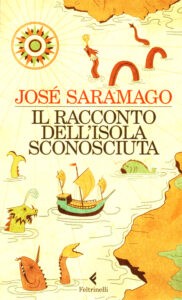
2015 (Trad.: Rita Desti, com a curadoria de Paolo Collo; capa e ilustrações “Atlante” de Battista Agnese — Museu Correr, Veneza)
Language
Italian
Un uomo ottiene dal re una caravella per partire alla ricerca di un’isola sconosciuta, che ancora non compare sulle carte geografiche. Alla ricerca si unisce la donna delle pulizie del palazzo del re. Un’incantevole favola d’amore, magistralmente sospesa tra realtà e sogno.
“Tutte le isole, anche quelle conosciute, sono sconosciute finché non vi si sbarca.”
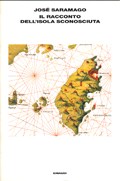
Einaudi
1998 (Trad.: Rita Desti, com a curadoria de Paolo Collo)
Language
Italian
L’isola sconosciuta è un luogo mobile che appare e scompare sulle carte della fantasia ma sta ben saldo nel cuore di ognuno di noi.Una favola d’amore raccontata dal Premio Nobel per la Letteratura 1998.
Japão

Artist House
2001
Language
Japonês
Artist House
2001
Mexico
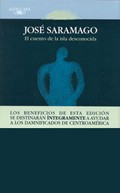
Los beneficios de esta edición son destinados íntegramente a ayudar a los damnificados de Centroamérica
UK
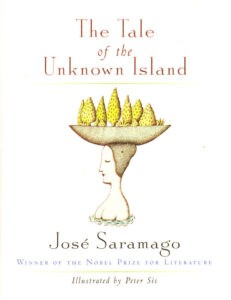
‘A man went to knock at the king’s door and said, Give me a boat. The king’s house had many other doors, but this was the door for favours (favours being offered to the king, you understand), whenever he heard someone knocking on the door for petitions, he would pretend not to hear…’Why the petitioner required a boat, where he was bound for, and who volunteered to crew for him and what cargo it was found to be carrying the reader will discover as this short narrative unfolds. And at the end it will be clear that what night appear to be a children’s fable is in fact a wry, witty Philosophical Tale that would not have displeased Voltaire or Swift.”Saramago writes possibly the most beautiful but certainly the most precise and differentiated Portuguese prose of our time”Walter Haubrich, Frankfurter Allgemeine Zeitung”Saramago is a writer of formidable talent and extraordinary imagination”La Repubblica, Milan”He is one of the rare contemporary novelists who works out his text as a veritable narrative mechanism: the carefully planned, somewhat complex architecture of his books gives them the tautness found in the best mystery novels, whose construction is of course their determining factor”Libération, Paris”To speak of the novels of José saramago is to speak of the sheer pleasure of reading”O Diário, Lisboa
Serbia
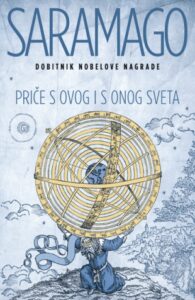
Šta se događa kada se stvari koje ljudi upotrebljavaju pobune protiv svojih korisnika?
Kako je jedan car pokušao da izoluje smrt?
Kakva je sudbina vozača, praktično zarobljenih u svojim kolima?
Zašto strada poslednji kentaur koji je vekovima lutao šumama, bežeći od ljudi?Ispitujući vlastite izražajne mogućnosti, Saramago se najpre okušao u kratkim formama – pripovetkama, kratkim pričama, parabolama… Sabrane u dve zbirke parabola Priče s ovog i s onog sveta i Putnikov prtljag, jednu zbirku pripovedaka Tobožnji predmet i novelu Priča o nepoznatom ostrvu, njegove pripovesti svedoče o sporim ali sigurnim koracima kojima se pisac približavao svojoj pravoj vokaciji – romanu. U ovoj knjizi njegovih izabranih priča čitalac će naći ne samo mnoštvo ideja koje će pisca zaokupljati čitavog života, već i sve osnovne odlike jednog neponovljivog književnog rukopisa, toliko drugačijeg da ga je nemoguće oponašati.„Velikan evropske književnosti iznosi nam u pričama svoj osoben pogled na raspad društvenih vrednosti, otuđenje i političku represiju, nudeći svoj odgovor na takve pojave: kada sve propadne, dobra metafora je najbolja alternativa.“ Morning Star„Ovde se majstor pera ogleda u kraćim, inventivnim proznim formama, i ishod je impresivan i lucidan. Saramagov dar i u pričama se neosporno ispoljio kao i u njegovim romanima.“ Publishers Weekly
Sweden
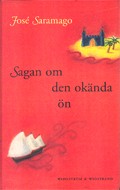
«Vad då för en okänd ö, frågade kungen och höll sig för skratt, som om det var en komplett galninig han hade framför sig, en galning med mani på segling som det inte vore bra att säga emot så här i början, Den okända ön, upprepade mannen, Nonsens, det finns inte längre några okända öar längre, De finns på kartorna allesammans, På kartorna finns bara de kända öarna…»Sagan om den okända ön är en ömsint skimrande novell om kärlek och om människans obändiga drift att söka nya världar bortom haven. Den ingår i en serie texter på temat Oceanerna vid världsutställningem i Lissabon 1998.
Tailândia
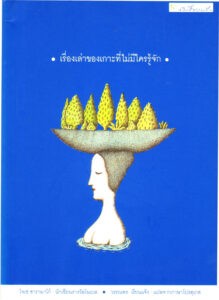
Morning Books
2002 (Trad.: Wannaporn Reanjang)
Ilustrações de Peter Sis
Language
Tailandês
นิทานปรัชญาเกี่ยวกับการเดินทางตามหาความสุข ความฝัน ความรัก และตัวเอง ซึ่งในที่สุดก็พบว่าสิ่งที่เฝ้าตามหานั้นไม่ต้องออกเดินทางไปหา ณ ที่ใดๆ เพราะสิ่งนั้นอยู่ในใจเรานั่นเอง เนื้อเรื่องดำเนินไปอย่างเรียบๆ แต่มีอารมณ์ขันและมุขเสียดสีสอดแทรกอยู่ ถ้าคุณเคยประทับใจกับ ” เจ้าชายน้อย ” เรื่องนี้จะไม่ทำให้คุณผิดหวัง!
Turkey
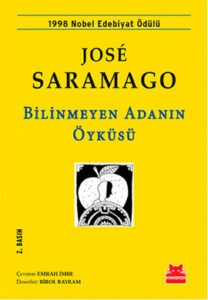
“Bir adam kralın kapısını çalmış ve ona demiş ki, Bana bir tekne ver.”
Bilinmeyen adaların kalmadığına inanılan bir dönemde bilinmeyen ada arama cesaretine sahip bir adamla böyle bir cesareti görüp hayatını değiştirebileceğine inanan bir kadının büyük usta Saramago’nun eşsiz anlatısında edebiyat tarihine geçen yolculukları böyle başlar. Emrah İmre’nin Portekizceden çevirisi ve Birol Bayram’ın desenleriyle okurun minör başyapıtlarından olacaktır Bilinmeyen Adanın Öyküsü.
“(…) ben bilinmeyen adayı bulmak istiyorum, o adaya ayak bastığımda kim olduğumu öğrenmek istiyorum, Bilmiyor musun ki, Kendinden dışarı çıkıp kendine bakmadıkça kim olduğunu asla bilemezsin, (…)”
“Saramago görünüşte sade bir öyküyü basit bir dille ve masum karakterlerle aktarıyor; okurlar, hayalperestler ve âşıklar psikolojik, romantik ve toplumsal altmetinleri fark edecektir.”
-Publishers Weekly-
(Tanıtım Bülteninden)
